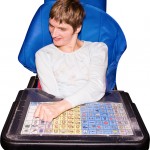
Speech and language therapy for adults with a learning disability is concerned with supporting people who have disorders of communication or difficulties with swallowing. Support is developed and designned on an individualized basis following detailed assessment and diagnosis although support and training for carers can be an important part of the support strategy.
The NHS commissioning support programme have just published a suite of tools which offer a guide to commissioners and service providers to improve the system, services and outcomes for children and young people with speech, language and communication difficulties.
They suggest that better commissioning can reduce dependency on the health, education and social care system. People who struggle to communicate are at high risk of poor outcomes in a range of areas.
They state that
one in six children who have difficulty in learning to talk and understand; the 7% of five year olds – on average, two or three in every classroom – who have specific difficulties in speech, language and communication and for more than half of children starting nursery school in socially deprived areas of England who have delayed language.
Each of the documents can be downloaded from the NHS commissioning support programme website. They are:
- Tools for commissioning better outcomes: introduction
- Needs assessment
- Whole system mapping and design
- User involvement
- Workforce planning
- Evaluating outcomes
Commissioning Tools for Improved Outcomes for Children with Speech, Language and Communication Difficulties, NHS Commissioning Support Programme, 2012
